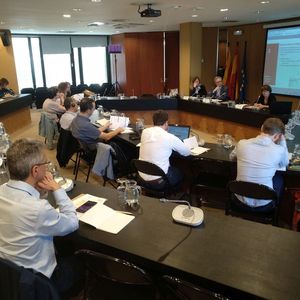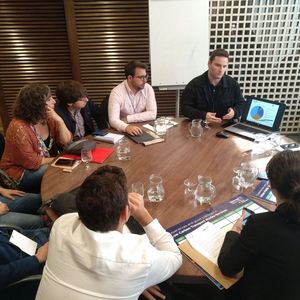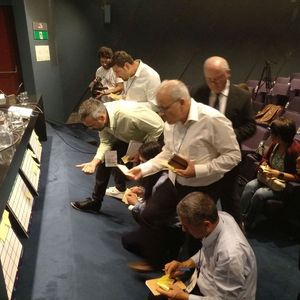Sustainable mobility training
| Subject: Sustainable Mobility, International Relations
High level training spaces allow 20 Mediterranean cities to share their vision on the topic

More than 20 Mediterranean cities from 12 different countries were trained on "Financing Sustainable Mobility" and "The Nexus between Tourism and Mobility" within the framework of Interreg-MED's urban transport community (UTC), organised by the Barcelona Metropolitan Area and MedCities.
The training courses, carried out within the transfer and capitalisation activities of the GO SUMP project, have the aim of strengthening technical capacities and promoting the transferability of the urban practices piloted between the Interreg-MED urban transport community (MED-UTC) and new cities interested in the process of exchanging tools and best practices in the area of mobility.
The topics were centred on two key areas identified by the UTC and were carried out in two parallel training courses, with a special emphasis on participation from cities in the southern Mediterranean region in the transfer processes with the aim of promoting sustainable mobility policies and more global practices.
I High Level Training Course: Financing Sustainable Mobility
Sessions of the Financing Sustainable Mobility course included panels which covered the most innovative concepts and also the most consolidated mechanisms in the area of sustainable mobility financing. For example, it counted with the participation of experts from the Wuppertal Institute who were responsible for developing the financing notebooks, including the new Urban Mobility Plan developed by the DG MOVE, and representatives from the AMB, TMB, ATM, IERMB and the Government of Catalonia, key actors in public transportation financing in the Barcelona metropolitan region.
II High Level Training Course: The Nexus between Tourism and Mobility
Pioneers in the subject of urban touristic mobility regulation and strategy from the Open University of Catalonia participated in the course The Nexus between Tourism and Mobility, as did the European Federation of Cyclists or CIVITAS projects and Interreg-MED, among others. There they presented methodological concepts and experiences in the matter of urban touristic mobility in the Mediterranean.
The training sessions fostered the strengthening of the capacities of technical departments from Mediterranean cities to promote sustainable mobility practices and policies. They also presented solutions from MED-UTC projects for promoting sustainable mobility models which are contextualised by characteristics specific to the Mediterranean, bringing experts together from the urban transport sector to explore synergies and share best practices and innovative ideas. In order to understand the current state of the urban transport sector in the Mediterranean area, including the challenges and advantages which it presents, recommendations were formulated for improving urban mobility in Mediterranean cities.
The activities closed with some peer-to-peer sessions between cities from different geographic areas of the Mediterranean, who shared their best practices and tools through some dynamics that favour the transfer of knowledge and study the potential to replicate them in new urban contexts.
Image gallery
Related documents
Related links
Where
















































